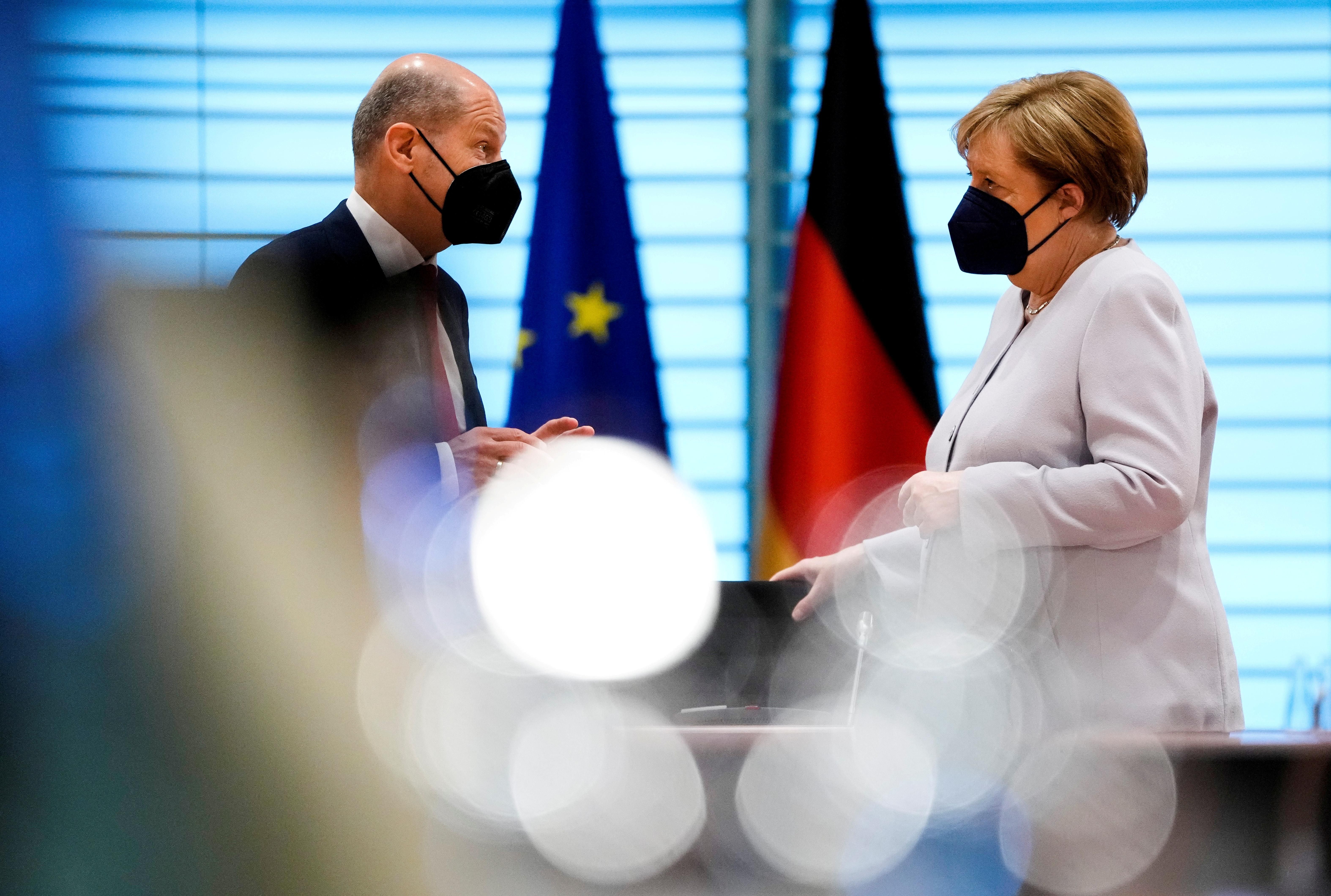September 23, 2021
Germany's historic moment of choice is finally here, and voters will stream to the polls on Sunday for the country's first post-World War II vote without a national leader seeking re-election. They will elect new members of the Bundestag, Germany's lower house of parliament. The leader of the party that wins the most seats will then try to secure a majority of seats by drawing other parties into a governing partnership. He or she will then replace Angela Merkel as Germany's chancellor.
If the latest opinion polls are right, the center-left Social Democrats will finish first. In coming weeks, they look likely to form a (potentially unwieldy) governing coalition with the Green Party and the pro-business Free Democrats, which would be Germany's first-ever governing alliance of more than two parties.
Change?
Though he's a man of the center-left, Olaf Scholz, current finance minister and most likely next chancellor, wouldn't represent a radical break from Merkel. He's among the more fiscally frugal of Germany's Social Democrats, and after decades in German politics, he's an experienced technocrat and a skilled manager of political alliances.
Nor would a change in government radically shift Germany's foreign and trade policies. Its new government, whoever it includes, will keep strong security ties with the United States and NATO and protect opportunities to expand economic relations with China. Germany's dependence on Russian energy will demand a continuation of Merkel's pragmatic approach to Vladimir Putin's government.
Scholz's conviction that a strong and cohesive EU is good for Germany will limit any temptation to get tougher with the governments of Poland and Hungary over their violations of EU rules and principles. And aware that COVID can widen gaps between richer and poorer EU countries, and that anti-EU economic populism remains a potent force in Italy and elsewhere, he's likely to support a generous approach to pandemic recovery in southern Europe.
But climate policy, an area where Merkel concedes she should have done more, will be an important and interesting story to watch. Given its leadership within the EU and its standing as the world's fourth largest economy, the influence of Germany's next government on climate policy will be crucial to global climate strategies. A new German government with Scholz as chancellor will likely push the pace of transition from carbon to renewable energy, at least in part because the Green Party coalition partner will push for this as hard as it can. The Greens must show progress on the climate front to maintain political credibility and popularity. If the Free Democrats are indeed part of the coalition, they'll push hard to limit tax increases to pay for tougher climate action, but they won't blow up the coalition that gives them a seat at Germany's governing table.
Merkel's legacy
Even in a country that values stability and continuity, Angela Merkel's 16-year run is remarkable. More than once she's proved the maxim that it's not the smartest or strongest who survives, but the one most adaptable to change. Merkel is smart and strong, to be sure, but she'll be remembered longest – by both devoted admirers and bitter critics – as the leader who insisted Germany could and should do more to help indebted countries survive Europe's sovereign debt crisis (2010-12) and to manage the surge of migrants that followed unrest in the Middle East (2015-16). Her improvisational talents also led her to change tack on nuclear power (after the 2011 Fukushima disaster in Japan) and on common European debt.
But the main reason Merkel leaves power with an 80 percent approval rating is that, whether she receives more credit than she deserves, she has presided over a period of economic expansion and prosperity in Germany that few other world leaders can match. It's all the more remarkable then that her party looks set to find itself in opposition once a new government is formed. It's Merkel that German voters like, not her political family.
Bottom-line: Whatever he accomplishes as Germany's next chancellor, Olaf Scholz will find Angela Merkel a tough act to follow.
From Your Site Articles
- Angela Merkel's farewell song - Kraftwerk mix | PUPPET REGIME ... ›
- Europe after Merkel resigns - GZERO Media ›
- What went wrong in Germany? - GZERO Media ›
- German election outcome begins new era of three-party cooperation - GZERO Media ›
- Germany's next government taking shape - GZERO Media ›
- Angela Merkel's punk rock farewell, Iran nuclear talks resume - GZERO Media ›
More For You
- YouTube
In this Quick Take, Ian Bremmer breaks down the protests across Iran and how the Trump administration might respond.
Most Popular
- YouTube
Welcome to the Jungle
© 2025 GZERO Media. All Rights Reserved | A Eurasia Group media company.
